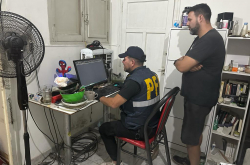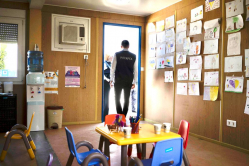INTERPOL has a long-standing commitment to combating crimes against children. It urges its member countries to use all the technical tools available to restrict the circulation of child sexual abuse material online.
Access blocking
Blocking users from accessing websites that show child sexual abuse material is an important part of the fight against this crime.
Access blocking is a preventive, transparent and informative measure that benefits the public in three ways: it prevents further victimization of children, shields Internet users from unintentional exposure to harmful material and prevents access for those seeking it.
It is important to note that neither INTERPOL nor other police authorities have access to logs or identifying data on the Internet users being redirected.
Access blocking should be used as part of a holistic approach to combating child sexual exploitation.
The INTERPOL ‘Worst Of’ List
As part of its effort, INTERPOL maintains and provides a list of open web domains that disseminate the most severe child sexual abuse material worldwide. Known as the ‘Worst of List’ (IWOL), it can be used by a range of partners, notably Internet Service Providers (ISPs), to block access to these sites.
This preventative measure can educate users who may be about to commit a serious offence.
By giving private partners access to IWOL, INTERPOL urges these entities to be collaborative and vigilant in ensuring that their services are not being used to view or propagate child sexual abuse material on the Internet. ISPs play a particularly important role in this effort, due to the wide variety of services they offer.
Baseline
To judge which content needs blocking and which domains should be included on the IWOL, INTERPOL checks images and videos against a Baseline list.
The Baseline contains the ‘digital signatures’ of some of the worst child abuse images and videos. If a signature matches, network operators alert the police and remove the material, thereby limiting its circulation.
The Baseline list is continuously updated with new file signatures, through the collaborative work of specialized officers in member countries and the INTERPOL General Secretariat.
Baseline criteria
A set of strict INTERPOL ‘Baseline criteria’ is used to evaluate child sexual abuse content. Content must meet the following criteria:
- Depicts a real child who appears developmentally prepubescent
- Contains serious sexual abuse, either directly or indirectly targeting a child
- Is validated on the above criteria by three independent reviewers
According to the above principles, the classified material is illegal in all of INTERPOL's 196 member countries.








